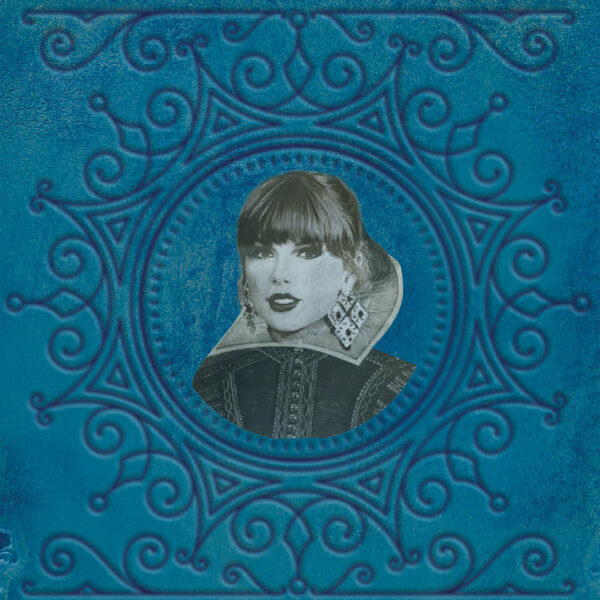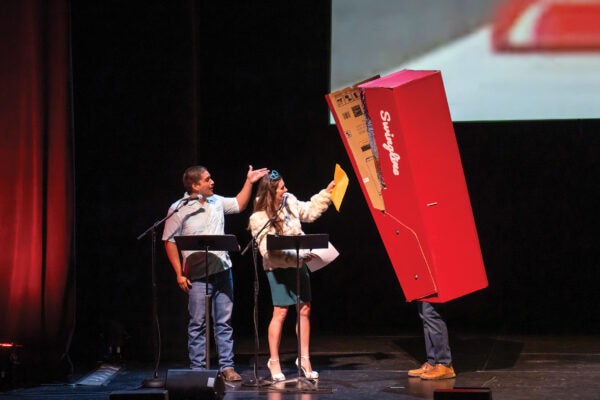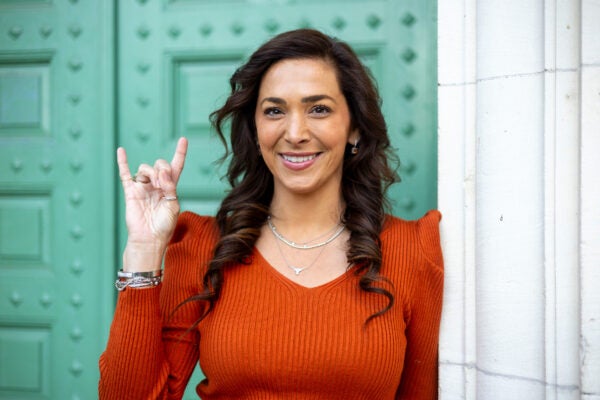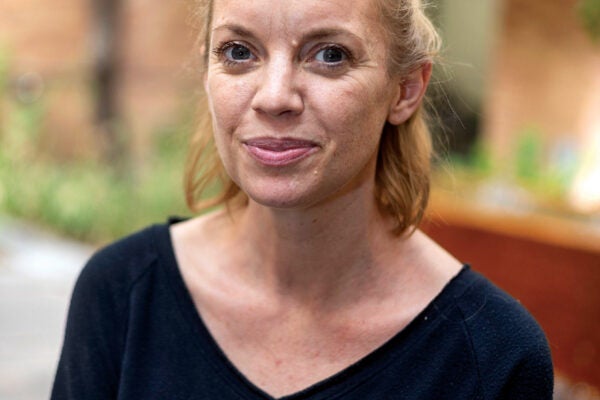 lizabeth Scala, an English professor in the College of Liberal Arts, considers herself a medievalist. She has taught about pre-Shakespearean English poetry and manuscripts studies, with a focus on Geoffrey Chaucer and “The Canterbury Tales.” But a very modern listening obsession during the COVID-19 pandemic, combined with her interest in finding new ways for students to get excited about old texts, launched one of the most coveted and famous classes on the Forty Acres.
lizabeth Scala, an English professor in the College of Liberal Arts, considers herself a medievalist. She has taught about pre-Shakespearean English poetry and manuscripts studies, with a focus on Geoffrey Chaucer and “The Canterbury Tales.” But a very modern listening obsession during the COVID-19 pandemic, combined with her interest in finding new ways for students to get excited about old texts, launched one of the most coveted and famous classes on the Forty Acres.
“I’m always trying to find ways to get freshmen interested in a basic skills class,” says Scala, who has been teaching at UT since 1995. “It’s hard to pick one type of literature or one author that is going to universally make everybody happy.”
Scala had used the “Harry Potter” series to teach about critical reading, writing, and research methodology in the context of other works in English literature. But the music of Taylor Swift — specifically “All Too Well” with the re-release of Swift’s “Red” album — made Scala consider a new version of her Liberal Arts Honors class.
“It just really started my brain going, thinking about the way she uses language, and how I could relate some of her writing practices to the practices of other poets and writers in the English tradition,” she says. “That got me really excited. … I thought maybe that would get students interested.”
When the Taylor Swift Songbook class first started in Fall 2022, Scala received a barrage of interview requests. Scala’s favorite interview, “Taylor Swift and the Era of the Girl,” appeared in The Atlantic.
“It was insane,” she says. “TV, radio, print, podcast, constant. Every day, one or two requests. It’s still kind of going on because (Swift) keeps doing stuff. ‘Midnights’ dropped, more media requests, the re-recording of ‘1989,’ more media requests, ‘The Tortured Poets Department,’ more requests.”
During spring’s class, students sat at tables arranged in a square and engaged in constant debate. The ongoing question of whether Swift is equivalent to the works of Shakespeare hung in the air.
“We compare her to Shakespeare all the time,” Scala says. “In class, we were finishing up reading ‘Romeo and Juliet,’ and at the same time, I assigned three songs from ‘Fearless’: ‘Love Story,’ ‘White Horse’ and ‘Mr. Perfectly Fine.’”

Scala identifies Swift as a love poet. Writing about the excitement of love, heartbreak, the aftermath of being in love, anger — this is what Scala defines as the origins of love poetry in the Renaissance.
“We are relating her to Shakespeare through the use of an articulate structure in the works,” she says. “Looking at the sonnet tradition, and then ‘Romeo and Juliet,’ and who the speaker is, who’s the implied audience and so forth, allows us to look at Taylor Swift songs in the same way, and intuiting what she’s doing allows us to have more patience looking at these older art objects.”
The class also spent a lot of time discussing Petrarch and the Petrarchan tradition of male unrequited love, looking at how these men write about women. Swift uses the same tropes, Scala says, but from the female perspective.
Scala says she looks to the more modern poet Sylvia Plath for comparisons with the confessional nature of Swift’s songwriting, which opens the discussion for students in the class who might have had similar feelings or experiences.
“I see female students in the classroom, their experience being put front and center in a way that maybe they have not always felt,” she says.
There’s been a lot of mind-changing going on in the class, Scala says. Students who came into Shakespeare thinking Juliet was childlike come to see her as “the most emotionally mature character in the entire play.”
Teaching a class by using a famous pop culture figure such as Swift is something Scala has had to get used to.
“What I work on is as far from contemporary American youth culture as you can possibly get,” she says. “Taylor Swift is so in the zeitgeist of everything … law, economics, politics, and everybody’s got some Taylor Swift angle. I spend most of my time reading 14th-century British poetry in manuscripts housed in England.”
When Scala created the course, she also created the Instagram account @swiftieprof, simultaneously acting as her own social media promoter and allowing those who are unable to take the class to “get a taste.”
Scala’s favorite part about teaching the course is that she’s not just teaching out of an anthology; she’s not bound to the traditional tools of literary analysis.
“You never have to worry about somebody telling you that this isn’t fresh and relevant,” she says. “There’ll be a new song analysis or a new music review online, and I can bring that into class. The world is your oyster.”



